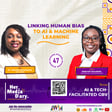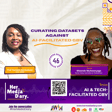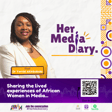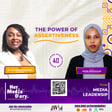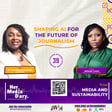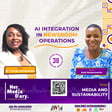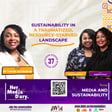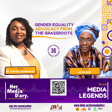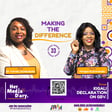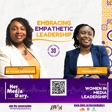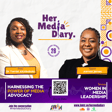Experiencing Harassment in Academia
00:00:00
Speaker
I didn't become a full professor in Cameroon because when I submitted my documents for full professorship, the person evaluating my documents told me, you have been keeping away from me. Now I have your fire. You have to come see me. And I reported to my university and nothing was done. That is sexual harassment of the highest order. It will never go public. I can even be challenged for telling my own story.
00:00:27
Speaker
nothing was done. Neither the females nor the males are reported to, because a man was a big professor of high administrative standing, high academic standing. How do I challenge him? When the systems in place do not protect me as a woman, and it happens with women in all other fields, it's not just in the academia, in politics, in the area in which I research, there are all those barriers and discriminations.
Focus on African Women in Media
00:01:01
Speaker
Welcome to another episode of Her Media Diary, a podcast that captures the lived experiences of African women working in media industries. I am Dr. Yamseya Kimbabola, your host. And in this episode, I'm joined by Professor Lillian Atanga, an accomplished scholar and researcher in the field of gender and discourse studies. Professor Atanga talks about the societal cognition of what makes a woman a woman.
00:01:29
Speaker
and how these cognitions put barriers on women. She takes us through some of the barriers she faced navigating academia as an African woman, both in Cameroon and in the diaspora.
00:01:41
Speaker
Now, I'm really excited about this particular series because I'll be speaking with African women in academia who study media and gender studies like I do and will be discussing our experiences of navigating academia, teaching and research agenda and those challenges we face and how we managed and navigated that way despite the hurdles.
Defining Identity Beyond Titles
00:02:04
Speaker
So I hope that by inviting these voices into conversation with me,
00:02:08
Speaker
we can provide tips and solutions to break down barriers faced by African women in media education. All right, so thank you so much for doing the interview. And like you said, we don't know each other, which is interesting because we're in the same field, we're scholars in similar subject areas and stuff. So I'd really want to
00:02:38
Speaker
take this moment to spend some time getting to know who Lillian Atanga, Dr. Lillian Atanga is, or Professor Lillian Atanga. Let me not reduce, never, never, ever reduce the hard work you've put into becoming a professor. It's true not to reduce hard work. And usually I don't use the title professor and people really get mad at me. They say, you don't know what you have. You don't know what power is in it. I'm like,
00:03:09
Speaker
It's not the title that makes me. It's me who makes me.
Barriers for Women in Academia
00:03:14
Speaker
And the partner I'm coming from, if I may just talk about it, is organized by the Association of African Universities, AAUS, that's it. And their title is Invest in Women in Higher Education.
00:03:29
Speaker
there were all these presentations we did of course you know that's going to be very bad and then the one i was listening to which just got finished was the only male in the panel and he was very defensive he says um
00:03:46
Speaker
my my dad had a first degree but then my mom my mom has a phd now my wife has a phd my sister has a phd we push women women have low self esteem so in the chat i just asked if the policies were good would you need to push women do men get
00:04:07
Speaker
You don't have to push men. So why do you have to push women? Why are you defensive? If everything were good, would women have low self esteem? Why are women having low self esteem?
00:04:24
Speaker
So thank you again so much, Professor Lillian for joining me in this really, really important conversation because we are both academics in a similar field and associate professor of gender and discourse studies. And I believe you're a Fulbright scholar at the University of Florida. That's correct. Yeah, you were. So but to start this interview, I always like to kind of go all the way back because I think sometimes
00:04:55
Speaker
Well, I think it is very, very important for us to really understand the journey, the influences, the background of the people that we speak to,
Childhood Influences and Gender Bias
00:05:03
Speaker
right? But specifically, because I found that a lot of when we're researching our guests or researching African women generally, our histories are not always that publicly available. So let's go way back to Professor Lillian's history. Tell us about you, your childhood, growing up, et cetera.
00:05:24
Speaker
It's interesting that an important bit of my childhood got lost to me until probably yesterday or this morning. I was born in Barford, rural Barford, and raised in Barford, which is a village in the northwest region of Cameroon. At the time, my dad was working with
00:05:52
Speaker
which was an engineering lot. He wasn't very educated. And he lived where he worked with my stepmom. My mom wasn't well. She lived in the city. So I lived in the village with my older sister and her daughter. At the time,
00:06:13
Speaker
she was a mom to me but today when I reflect on it she might have been a woman of maybe 20 or 22 which was really young but for me at that time she was a mom I remember they used to do everything for me to be fine though buying me shoes in a context where every other child worked barefooted
00:06:37
Speaker
So when I'm going to school, I'll take off my shoes and hide in the bush because I insisted I wear shoes. But I would not be the only kid wearing shoes. So when I'm coming back, I'll pick the shoes and wear. And then my feet will be cracked and do not understand why my feet get cracked when I wear shoes. Then in the school in which I was, in my classes, I was the most brilliant for all my seven years.
00:07:05
Speaker
I took the first position. Because of that, I got persecuted by boys and by teachers. And my sister would beat you, fight you, come to school and fight my case. I was a kid. Them all these things, they meant nothing to me. They happened to me, but it's only now that when I think of it,
00:07:29
Speaker
I see that 20 year old single mom illiterate, not really illiterate because my dad didn't send her to school because she was a female, but my brothers went to the most prestigious schools. And she did all of this for me. She taught me at home. That's why I was always the best. And then I went to secondary school, all those things of the village.
00:07:57
Speaker
they stayed behind. I moved on until I went to the university in Cameroon, I did my Masters in Nigeria, I came back, I started teaching in the university in Chang, and then for my PhD I applied for so many universities and scholarships,
00:08:17
Speaker
And I got the Commonwealth scholarship because I saw the form somewhere, picked it, applied it. And the university had selected two males. They didn't select me. I applied independently and got the vice chancellor to sign. But the university selected two males and got the vice chancellor to sign.
00:08:39
Speaker
So when these three applications went to the UK, the UK selected me and told the university to choose one of those two males. The university came back to me and asked, who told you to apply for this college? We have our candidates. They were so hard on me and I thought I lost it.
00:08:59
Speaker
And then the UK government writes to me again, come for your visa
Gender Perceptions in Education
00:09:04
Speaker
and all of that. So all of this background, I really didn't put every string together from the beginning of how I got to where I got. But on the gender beat, my dad raised us as equals. There was no woman.
00:09:23
Speaker
There was no man. When he came to farming, the distribution of labor for girls and boys was the same. There was no discrimination. In short, in everything he didn't discriminate between boys and girls, he went as far as telling us the girls that your first husband is your job, not a man.
00:09:45
Speaker
And he stopped all the girls from getting married until they attained a certain level of education. He even rejected my sister for a certain period of time because she got married instead of having her PhD. That was a kind of dad I had. But these things, why am I telling you these things? Because when you are raising a child from a very young age,
00:10:11
Speaker
The input that that child gets, the societal cognition, what is said at home, what is done at home, kind of builds the woman or the man. And then in society, they start doing things and people start wondering, why are they like this? It's not cool. It's the baggage from the society, from the family that builds the person. Well, I mean, there's so many amazing gems that you set there.
00:10:40
Speaker
If we were to go even back to your primary school years and you talked about how you were the best in class largely due to the fact that your sister was home tutoring you whilst being a single mom herself and also you mentioned that she was not educated. What she got was primary school education. Primary school, yeah. And you said you had like a lot of pushback back then also because of your brilliance. What are your specific memories around that?
00:11:12
Speaker
Okay, there are two particular memories. And what would be, it's called class five, that is the fifth year of primary school. Because I was the best, I was the teacher's best friend and the teacher's assistant. So when a test is given in class, I'm the one who grades the scripts.
00:11:36
Speaker
So when I grade the scripts, the teacher just inputs the marks and the students, when it is handwork time, handicraft time, I'm the one who supervises the students and I created enmity. Any student who failed, I'm the one who failed them.
00:11:54
Speaker
Any student who did anything wrong, I was blamed for everything. So there was this day after school, on my way back, this group of boys, they hit themselves on the way. When I got there, they caught me well. Oh no, really? Yes.
00:12:13
Speaker
I was beaten because they failed and to them I failed them. I didn't fail them. They failed. And when they were beaten, my sister learned of it and came to school and got all the boys beaten and got and watched the teacher. If anyone watches my daughter again because she raised me like a daughter.
00:12:36
Speaker
She was feared. She was pretty. She was one of the prettiest women in the village. But she was also feared because she feared nobody. She did all the things that men did. She rode my father's motorbike. She rode my father's tractor. She climbed palms. She tapped palm wine. She made oil, which are all male things. Women don't do those. As a young girl, she did all of those things. She broke all the barriers.
00:13:04
Speaker
So my classmates beating me up because I was grading their scripts was phenomenal. A second one, I was promoted. I skipped one class to
Journey to Academia and Gender Studies
00:13:16
Speaker
the next class because my intelligence level was higher than my peers. So I was sent to the next class. And the other teacher who wasn't my teacher was very angry.
00:13:28
Speaker
and withheld my report card and said I have to pay. Because of that, I wrote the common entrance exam into the secondary school and because my report card was held down, I was not admitted into any secondary school.
00:13:46
Speaker
because of that, because they said the new report card I had was fraudic, which wasn't true. It was simply a copy from the master copy. With all of this, I think having the intelligence level I had,
00:14:01
Speaker
I am not in any way insinuating that my intellectual skills were higher than those of other children, knowing that the learning process has so many variables. I had comfort that my single mom, young sister gave to me that all the other kids didn't have.
00:14:22
Speaker
One, I felt well at home. I was wear cloth. I was tutored. I was not even given an opportunity to fail because if I fail one song, I receive 10 beatings for it. So that home background empowered me. And I believe the other kids, all the learning they ever did was in school. Once they got home, there was nobody to mentor or tutor them. And my sisters serve confidence
00:14:52
Speaker
gave me self-confidence. However, I didn't have physical strength. I wasn't muscular. I was tiny. I was dainty. So I couldn't fight my battles. She fought my battles for me. So I do, however, think that that foundation that she gave to me as a village girl who was distinguished from the other village children
00:15:17
Speaker
has moved along with me through life. Although my secondary school was a bit challenging because I was poor, I moved from the village to the city where students dressed better, they had more money, they did more things. I didn't have the support my sister was giving to me in the village, I was now left alone. Not that I didn't succeed, but my self esteem was a little bit beaten down because of that competition.
00:15:44
Speaker
Yeah. If you reflect on the impacts and the kind of teaching that you gained from who your sister was, how would you say that foundation? I know you kind of started talking about it.
00:15:58
Speaker
How has that foundation contributed to where you are today? My sister was the woman who broke all the barriers. She even dated a white guy at that time when white men were still new. I would use the word new to my community.
00:16:15
Speaker
She lived a modern life more than other people. She did things that women don't do. She fought men. She was the man. When I reflect on my family, she is still the most manly man, if I can use the African understanding of man and woman. She is still the most manly man in my entire family. When I reflect on myself today, subconsciously I am like
00:16:44
Speaker
And none of the battles I have in life are because I am not feminine enough, not in physical presentation, in my thinking. But isn't that interesting though, right? So, I mean, what the hell is feminine enough, right? And how do we get to that mindset of
00:17:03
Speaker
there being a type of femininity we should embody. Again, this is cognition, societal cognition. How do you define a woman? When I, I remember my first gender class when I came back with my PhD and I was all excited to teach gender, I asked, what makes a woman a woman? Say, hey, madame, what kind of question is that? I say, yes. What makes a woman a woman? They said breast, yeah.
00:17:31
Speaker
a vagina. Yes. Is that biological? I see. Biological. And then I say, what are the kinds of things that women do? There were all the reproductive rules. And I asked, can a man change a baby's diaper? But no, madam, how can a man be doing that? This way, university students, I say, why? It's a woman's job. And I asked the question, if a woman, if a man changes the diaper, it wouldn't work.
00:18:01
Speaker
They say they can, but they shouldn't. They can cook, but they shouldn't. So this social cognition puts barriers, and we internalize it, and then we leave it, and then it becomes a norm, and then we fight each other. Because now, as university professor, as recently as five years ago, a professor, not a doctor, told me probably
00:18:31
Speaker
You know that we are women now. We cannot pretend that we are not women. We have to give our men the respect they deserve. And not in any way insinuating men don't deserve respect. But I am saying that we tend to lower ourselves to raise our men. Not because they are better, but because they have a phallus. A phallus defines a man and nothing else.
00:18:59
Speaker
according to such social cognition. And when you begin to question and move beyond this social cognition, you become a deviant. I listen to Komi Musa's podcast with you, and she says, so try it. Someone recently asked my friend that, has that professor Lilian Atanga gotten married?
00:19:26
Speaker
I'm lacking something because I'm not married. I am nothing without a husband. That is societal cognition. But they have not stopped to ask. Is it because a man has never asked her for marriage? Or is it because she hasn't had what she wants?
00:19:50
Speaker
because obviously we don't get to choose, right? So at what point, what were the influences that directed you towards academia? Did you plan to go into academia? Did you plan to go into gender studies? How did that journey emerge? Interesting, yes. To go into academia,
00:20:14
Speaker
when I was in the University of Yaounde and the current minister of secondary education in Cameroon was my professor, Professor Nalova Leon, that she was teaching.
00:20:29
Speaker
Okay. She was young. She was pretty. She was intelligent. Her accent was beautiful. She travels to be an international visiting professor in many places. And I'm like, I want to be like that woman. Yes. She doesn't know. I've never told her. If she does listen to this, she will hear. I hope she does. Then it was not
00:20:58
Speaker
a critical decision. I just wanted to be like her. It was not that I want to be in the academia. Those are two different things. But I think that was a foundation. The second thing about doing gender, when I came back with my master's degree from the University of Jersey in Nigeria, I have this Reverend father who thought I was better than being a secondary school teacher.
Pursuing a PhD and Overcoming Challenges
00:21:24
Speaker
And she actually got me to register for a PhD in the University of Boia. So when I registered for that PhD, there was the Department of Women and Gender Studies. And there was this professor, Professor Joyce Endeley.
00:21:40
Speaker
at the time was like the only one around and I said can I use your library because one of the courses I was doing had to do with gender and she had all these gender books and she let me use a library when I went into the library the books I saw the titles I saw the content
00:21:59
Speaker
I felt a burning in me, you know? If you are a Christian, when Jesus was moving with the disciples to Emmaus and was speaking to them, they said they had a burning in them. When I saw these books, I had a burning in me. That was the beginning. And the questions that I was not able to ask and answer
00:22:22
Speaker
The book allowed me to ask and answer those questions. So those books were my foundation for gender and made me know that I can ask certain questions even if I can't have such answers. That was my journey, the beginning of my journey into gender. But Boia University was very frustrating in the sense that
00:22:50
Speaker
the absence of human resources, the absence of financial resources, toward the PhD process. So I started looking out of Boia and then I saw a conference on language and gender being a linguist because I initially did syntax, grammar. It didn't, it didn't, I didn't feel it.
00:23:15
Speaker
I wanted to work with people. I'm not words and phrases and grammar, no. So when I saw a conference on gender and language, I'm like, really? And then I looked at the book of abstracts. Wow. Really? And then I looked at the university that organized it. Really?
00:23:37
Speaker
So there was this woman, Jane Sunderland, Dr. Jane Sunderland, who eventually became my PhD supervisor. I looked to her and I said, I want to come to your university and spend a term to use your library. I'm doing a PhD and I want to work on gender and language. And she said, oh, the tuition for term is $7,000. 7,000 pounds. 7,000 pounds for a Cameroonian? That's seven millions here.
00:24:05
Speaker
That is a lifetime salary. I can't afford it. I gave up. I almost gave up the PhD in the University of Boia. Then I started applying for scholarships. I applied for more than 30 scholarships. Wow, yes. That's how determined I was. The year I had my Commonwealth scholarship,
00:24:30
Speaker
I had a partial scholarship in University of Strasbourg to go study. But then, I being English speaking, I didn't want to go to France, of course. That would be extra stressed and strained on me.
00:24:45
Speaker
And that's how I moved to Lancaster into this community, not of gender and language, but gender and discourse. Critical discourse analysis, where you don't only hear, you question, you ask the whys, you look for why is it like that? And that is what has made me into who I am, the very critical me.
00:25:11
Speaker
I love what you said earlier on about that light bulb moment when you kind of realize this is the thing for you, this is the field for you. Because I still very much remember like it was yesterday, the moment that I realized that women empowerment media was the avenue for me, right? Because my PhD was on state media relations and regulations and that kind of stuff. But actually, it was many years later, a conversation with a PhD student, once I talked about women's rights and African feminism. And I just remember leaving that
00:25:41
Speaker
conversation with that light that you set that fire burning within you because you kind of just know right you know you know the moment when you found your niche the question though is taking that step to create that space for yourself and from your story I can see many barriers many kind of hurdles that you overcame when you reflect on
00:26:03
Speaker
all of those things. For those people listening now who are kind of in that moment when they have that light bulb moment where it's action taken is the barrier for them. The next step is the barrier for them. What would you say was the key to you taking those actions that you needed to take? I'm going to go back to my dad again. My dad didn't invest
00:26:28
Speaker
materially on me, like spend money, buy me clothes or buy me whatever in life. But my dad's words, they haunt me till today. When I say haunt, it's not in the negative sense.
00:26:44
Speaker
My dad, when he shares farm potions, equally to males and females, you have to finish your portion. He would tell you it is the eye that fears work and not the hands, which means that all the barriers you create them, there is no limit to what you can attain if you insist and persist on it.
00:27:10
Speaker
With all the educational barriers, Cameroon not really offering quality, accessible, available, higher education at that time. When I say higher, I mean at the doctoral level. The only university was there, but then there were the language barriers and overpopulation. The English-speaking university, which was Boya at that time,
00:27:34
Speaker
had not matured enough for PhD studies and the human resources were not enough. That was a big barrier for me. I didn't want to go back to Nigeria. I didn't have the resources
00:27:51
Speaker
I had vowed to myself that I'm not going to study again if I'm going to pay for myself. It has to be a scholarship. That is why I said I applied for over 30 scholarships because that was not going to be a barrier for me. I knew there was that opportunity
00:28:13
Speaker
I wrote my PhD proposal. It took me a year because I wrote it. I gave it to everyone who could read to read. I didn't give up. I gave it to professors, to colleagues, to students, to everybody. I kept perfecting on it. I might tell people that I got a scholarship because I identified a problem
00:28:40
Speaker
and a possible solution, which means you don't just study for study's sake. You don't have certification for certification's sake. You have that certification to solve a problem. And for me, at that time, after seeing the books in Professor Joyce Enderley's office, there was a problem of understanding women in public spaces.
00:29:06
Speaker
because women were soon as private and my PhD data indicated that even when women are in parliament, they are persecuted in parliament because the speaker of the parliament said after a woman spoke and challenged men and criticized systems, the speaker turned around and told her, Maram, translating from him, does your husband know that you are like this?
00:29:36
Speaker
I'm going to tell your husband that this is what you say. That is a space where people are supposed to speak on issues and a woman's on an issue and she's challenged. Yeah. And it's so problematic because what I'm gauging from your story, representation has been so critical to who you are today.
00:29:56
Speaker
And where we have our so-called leaders having that kind of mindset. And those are the people that we're seeing on TV on making decisions by country. If that is the mindset of the leaders and how we making sure that we're producing a new generation of men and women who have a changed mindset about the position of women in society. We have to stand up for ourselves and for other women because sometimes
00:30:25
Speaker
The men, I'm sorry that I'm sounding really binary here. Those who are non-binary, they will. But I also argue that coming from the background in which I am, which is very heterosexual, which is very binary, you cannot avoid not being binary.
00:30:44
Speaker
in a recruitment panel in a university in which I was present. They keep recruiting males. I say, are you seeing women? How do you just go for men? These women are qualified. I said, we have to bring in women. And then when they go to a fire that is women, they say, hey, Dr. Lam, this is your candidate. As if we are just bringing in masses of women. If the women were not qualified, they would not apply. So the thing is,
00:31:13
Speaker
We have to, first of all, know ourselves, empower ourselves. There is a concept of tokenism, which I absolutely hate, bringing in women for tick-boxing. Yes, we don't just want tokenist positions. We want to be substantive, but we also need to work on our own, not let those barriers be a hindrance to us.
00:31:39
Speaker
Not fear, the fear factor. We need to take out that fear factor. We don't need to whisper our ideas to males to take credit for it. We need to assert ourselves. And part of asserting ourselves is lifting up your finger to say, I can do this, not just sitting when you can do it.
00:32:00
Speaker
Men go out there and they fight. They don't fear criticism. Even when you find a very dumb man, he puts up his honor, he can do it. You are better than you. You don't put up your hand because you think, hey, I'm a woman. Can I do it? Why would they say? I've received all kinds of names. I've been called all kinds of names. A name doesn't kill me. It doesn't. So you've written about experience of women.
00:32:26
Speaker
in higher education Cameroon, and both you and I are African women academics who have taught in diaspora. So I mean, you've seen a lecturer in the UK, you've taught at University of Lancaster when you were a PhD student and at University of Florida, right? And also you're currently in South Africa. So in many of those locations, there becomes a situation where our gender intersects with other things around race and ethnicity, for example, right? So what has been your experience in that
00:32:56
Speaker
context of intersectionality where your gender intersects with other forms of identity in the places that you've been teaching at?
Race, Gender, and Identity in Academia
00:33:04
Speaker
The United States was a really good context because the class I taught was a language, gender and politics class and it was an undergraduate class and a graduate class. The graduate class had masters in PhD students
00:33:20
Speaker
But given the context of the United States, issues of LGBTQI are pretty prevalent and it wasn't a situation. In my department, there were no black professors. It's true, I did just 10 months there. There were no black professors, but I didn't particularly have any issues of race.
00:33:49
Speaker
in my encounter in my time as an individual in the University of Florida. Although I heard stories about it, I didn't experience it. However, in Lancaster University, I taught English for academic purposes to international students who are coming in for master's and PhD programs. I was good. I know I am good.
00:34:17
Speaker
And when I started teaching, there is this Chinese student who worked out of class and gave up the program that he didn't pay his money from China to be taught by an African. An African. Wow. Yeah. And he left. So after that, the next year I applied, I wasn't taken. You know, those things, they happen in both cases.
00:34:43
Speaker
My gender identification was not an issue, but race was an issue. I think I'm one of those persons who focuses on her goals rather than on the environment and which goals are, I strive to get what I want. But then the African context is very hostile when it comes to sexuality and gender identification.
00:35:11
Speaker
Sometimes not intentionally meaning to put you off, but just being themselves. I didn't become a full professor in Cameroon because when I submitted my documents for full professorship, the person evaluating my documents told me, you have been keeping away from me. Now I have your fire.
00:35:31
Speaker
You have to come see me. And I reported to my university and nothing was done. That is sexual harassment of the highest order. It will never go public. I can even be challenged for telling my own story.
00:35:46
Speaker
nothing was done. Neither the females nor the males are reported to because a man was a big professor of high administrative standing, high academic standing. How do I challenge him? When the systems in place do not protect me as a woman, and it happens with women in all other fields, it's not just in the academia, in politics, in the area in which I research, but there are all those barriers and discriminations.
00:36:17
Speaker
Let's talk a little bit more about your research, you know, your gender and discourse, right? So tell us more about the kind of work that you've done, particularly those that you've found that has been impactful, both in the subject area, but also for you and your career.
00:36:35
Speaker
gender became so salient to me that at the end of the day not just my research and publication but my teaching you didn't talk about teaching i'm bringing it in i'm gonna bring it in after this actually that's my next question yeah okay
00:36:50
Speaker
So my research, like I told you, after being initiated into gender by Professor Joyce and Delia and Professor Nalova Leongar, they both got me to teach in the University of Boyer in the Department of Women and Gender Studies. Starting from my PhD, one motivated me to do a PhD in the topic in which I did my PhD.
00:37:14
Speaker
I don't know how it is in your context, in your country. There are courts, traditional courts, secret societies, which are the powerhouses, like the parliaments and the ministries in the village level. At the time I grew up, and till today, there's what we call the queer for witches, a secret society. It's a court. They have
00:37:41
Speaker
you don't women don't see ordinary men don't see and women don't belong to that call they are the king makers they are the law makers they are the rulers even the king is called the child of creeper which means that the king is subject that they are the most supreme body in leadership in my um in my village so the question i asked was why is it only men
00:38:06
Speaker
who are members of these secret societies. Why not women? And why can women not see and men can see the Jews? Women cannot see the Jews, but men can see. Men can get themselves initiated. And
00:38:22
Speaker
They have all of these ceremonies and they receive gifts and power and all of that when they are coming. People have to bow and greet and give gifts to them, but women don't receive that. So when I started questioning these relations of power, I looked then at the modern political systems, the governments.
00:38:42
Speaker
and the government of Cameroon and I saw the parliament and I asked if the parliament and the the government with ministers why are there few women in the ministry in the parliament as divisional officers as governors there were no women till today there are no female governors so these questions started coming to mind with the few books I had read in in boya when I went to Lancaster
00:39:11
Speaker
The approach my PhD supervisor did was, like you, tell me your story. And I started telling this story and said, there you go, that's your topic. And that's how I got into investigating why women are not in powerful context.
00:39:27
Speaker
which are the leadership context, where decision-making happens that affects the lives of these women. How is it that women don't get to be part of the bodies that make decisions that affect them? And that's how I got into researching women in politics, women in leadership, but then language comes in. It all happens through language.
00:39:53
Speaker
when a mother tells a daughter you have to get married and make children or you have to stay in that house and take care of the children and let your husband do the things what are you doing to that girl you're positioning her you're limiting her and you're using language and those words they keep ringing in the mind of that individual so like i say all those things motivated me researching in language how language
00:40:22
Speaker
or discourse, because discourse is just beyond language. It's also how we present ourselves, the semiotics of language years, how they contribute to empowering or disempowering women in decision-making positions. So that has been my niche, looking at women in power, gender relations, political relations,
00:40:48
Speaker
And around when I came back, the first several years, the first maybe five years post-PhD, I was working with someone in the area of media and communication. And that's how I got into media outcomes. And elections were happening in Senegal and in Cameroon.
00:41:16
Speaker
and two things happened. In Senegal, they attained parity, gender equality in their parliament. In Cameroon,
00:41:27
Speaker
they were campaigning for parliamentary seats. And because of this, we began looking at how these women were presented in the media in the two countries. How were they represented? How much time did they have? What was the content of their interviews? What are the interviews where newspaper interviews or TV interviews or radio interviews? What were the kinds of questions that were asked to the women?
00:41:52
Speaker
when the women's profiles were being written what was written about the women's profiles and it became so revealing that even when a woman has broken the barrier of moving into spaces that are deemed to be male spaces the society still puts a lot of pressure on her bringing the domestic to the public
00:42:17
Speaker
fronting her family, her husband, her children, her social connections, her religious connections, her cultural connections. Meanwhile, hardly, the men's wives and children and social and cultural connections were brought. Their political connections were fronted. Again, the question we ask is the people asking the questions or writing about these people.
00:42:47
Speaker
What is happening to their cognition when they do these things? Have they been socialized in such a way that when you see a woman, you see a man and children at the home and you see a man, you see a leader and the public and the office and all of that. And we realized that the way women were presented in the media has an inherent contribution to her success.
00:43:14
Speaker
as a politician and in many ways place against a woman because whether you're female or male in voting for a leader you want the leader that is going to do those political things not those domestic things and then when the women were presented as domestic they were not seen as politicians and then they were not voted as politicians.
00:43:36
Speaker
And both women and men were guilty of the crime of these representations of women. That's how I got into discussing media and women and politics and all of that. Politics, yeah. That's an interesting conversation because we last year for the whole of 2023, we did a one year project on media and young women in politics in Nigeria and Kenya, because both were
00:44:05
Speaker
countries that were going, had just gone through elections. And so we're looking at kind of the media representation, like you said, the kind of interview questions that were being asked, the ways in which they were portrayed, the context in which they were portrayed. But also we looked at the aftermath, right? Because in Kenya, you saw a huge rise of women, of young women who took part in the political process. And often the media representation obviously impacted their elected policy, but also post elections,
00:44:34
Speaker
there was a lot of trauma, right? There was a lack of attention on actually the experiences beyond. So after the elections, after they spent all of that money and put themselves out there and counted all of that danger, what happens to them, right? And what is the media's role in kind of raising awareness around all of this? So there's quite a, it was quite an interesting kind of project that we did in both of the countries. And also the countries that kind of have
00:45:01
Speaker
that ratio targets.
Teaching Gender and Human Rights
00:45:03
Speaker
So in Kenya, they had a target of X percentage of women should be in parliament. Whereas I don't think we have the same thing in Nigeria. So it's interesting to see kind of how those systems were operated in those countries. But I want to go back to something that you said very early on in our conversation around when you started teaching about gender and the questions that you asked or that you posed and how you were responded to in the classroom. When you're talking about
00:45:31
Speaker
Issues, I mean, issues to do with equality, diversity and inclusion is often very difficult for others to hear sometimes, right? We're often challenged to justify why this is an important topic. So when you go into a classroom of students and you're taking the position that you are, what has been your experience and what has been your go-to approach in educating a new generation of men and women?
00:45:57
Speaker
to think differently when it comes to gender. My most interesting class, most like all time interesting, was in the Pan-African University of Water and Energy Sciences in Algeria.
00:46:13
Speaker
The Pan-African University has really good gender policies. They try to be as equitable and balanced as possible in the recruitment of students such that the margin at the worst is 45-55 at the very worst. Either way, so the classes are really gender balanced.
00:46:38
Speaker
This is a university of engineers and policy makers, which means it's a real big mix of people who are not in social sciences and some people in social sciences. And the class I taught that year had students from 34 African countries. So in class, the class was gender and human rights. It was my first time of teaching that class.
00:47:07
Speaker
and I went into class and I usually start by just asking questions getting the mood of the class going and in course of teaching there were these debates guys from the most conservative African context you can never imagine guys who cannot even imagine that they can wash a plate after you
00:47:34
Speaker
I'm talking about washing your plate after eating, you know. And we brought all these things about equality, about barriers. The female engineers shared their challenges. The policy students, they shared their challenges. At the end of the day,
00:47:55
Speaker
when I brought out all the issues relating to gender and how nothing stops a man or a woman from doing something because of their gender. At the end of that class,
00:48:10
Speaker
the feedback form. He went to the director of the school and he said, Professor Atanga, what did you do to these students? I've never had a feedback form which is 100% all positive. The reason is because
00:48:26
Speaker
The approach to teaching gender is not confrontational, it's expositional. You lay out issues, you get them to appreciate the issues, you use their own situations, you use their models and their sisters to view things.
00:48:44
Speaker
What stops your mother from being like me? I'm standing here, I'm teaching you, I'm a professor, I'm accomplished, I've reached my actualization level. It doesn't make me any less a woman or any more a woman. I can stay cook, I can stay serve you, I can stay feed you, but not by obligation, not because it's my duty, but because I love you.
00:49:12
Speaker
And those perspectives, they break down, they broke down a lot of barriers and guys, they started thinking otherwise. And the hardest topic was female genital mutilation. Yes, yeah. There were guys who couldn't imagine how there would be no circumcision. There are guys who couldn't imagine how a woman can have orgasm. It's not natural. Wow.
00:49:39
Speaker
These are things that they don't even know the alternative. Both women and men, they don't even know the alternative to that gender problem because it's been so natural to them that they don't know the difference between nurture and nature. Yes.
00:50:02
Speaker
So after all that learning, it shaped mentalities, it shifted understandings. Even if they were not 100% into equality, they understood a lot of it. I bring this group of students because the Muslim students, particularly in class, had a lot of challenges. And there is one.
00:50:26
Speaker
that I followed until she is doing her PhD. She almost had her divorce because she went for a PhD. And she is doing the PhD because I am a professor.
00:50:38
Speaker
Sometimes just being you is a lesson of its own. So representation is important. The more you see people in the parliament, the more you know you can be. The more you see people in engineering, the more you know you can be. The research I carry out and the publications I do
00:50:58
Speaker
are not just explaining situations, they are seeking for understandings without blaming of why people behave the way they behave and say things the way they say. Because when you do a critical discourse analysis, you don't just look at the text, you look at the context of the production of the text.
00:51:19
Speaker
What is it around this that says that a woman should cook for a man? Or a woman must be married? Or a woman must have a baby? Must a woman give birth to a child? Is giving birth to a child what makes you a woman? Is getting married what makes you a woman? Are you any less if you don't marry and you don't have children?
00:51:41
Speaker
No. Are you any less if you get up and give your cheer to a man to sit or whisper your right answer to a man to take credit because you cannot speak in public? No. So these things are contextual and until we begin to deal with the context, the song of gender balance will not be enough and it starts from the boom.
00:52:05
Speaker
and the primary school and the secondary school. By the time we miss it at the secondary school level, we've missed it because they are already made.
00:52:13
Speaker
So I think that one of the things we need to work on are curriculums at the very basic levels to try to balance the perception of how we see ourselves as males and females. Yeah. Professor Atanga, it's been a pleasure speaking with you today. And my final question to you is what are your parting words of advice or listeners about academic life, especially those
00:52:44
Speaker
Practitioners who I know, there's lots of them that think, okay, after I'm done here, I'm going to go and teach in the classroom. What are your parting words for those coming into academia?
00:52:55
Speaker
Academia is, I would still want to speak for myself.
Advice for Aspiring Academics
00:53:01
Speaker
From my context, I'm considered a successful academic and I think I am. You don't have to succeed to please anybody. You don't have to succeed. One of the things I used for myself was I don't publish to change grades.
00:53:18
Speaker
I don't publish to become a professor. I don't publish to be appointed. I publish to share knowledge, to expose, to teach people. So if you go into the academia and your focus is research, is bringing out that thing that people don't know and sharing it with your students and the community and the world to impact
00:53:46
Speaker
to impact your community and your world. You are going to make a good academic. If you are going in just to succeed, you may fail. Make it a passion for you and not for your employer. Brilliant. Thank you so much, Professor Tanga. It's been such a pleasure hearing your story, hearing your insights, your intelligence, everything. Thank you so much for your time today. Thank you. Thank you. Thank you. And before you go,
00:54:15
Speaker
You are a phenomenal woman. I like to have your phone number. I like to have you as your friend. I am definitely going to go into your inbox, send my number. Absolutely. I think we've got so much in common. There's so much of your story that, you know, I'm not ready to share on the podcast, but that's so resonated with me. So we'll continue that conversation on the phone. Thank you.
00:54:42
Speaker
Professor Tanga's story speaks to media scholars who are passionate about gender and discourse and who seek to base scholarship on our lived experiences as African women. She also suggests that we adopt the expository approach to teaching gender as opposed to a confrontational approach. And I'd love to hear your thoughts on this. So drop me an email at emc at africanwomenandmedia.com with your thoughts and also if you'd like to join me in an episode.
00:55:10
Speaker
do let me know. So to find out more about African Women in Media and our work, visit our main website at AfricanWomenInMedia.com. In the show notes, there are lists of organizations and resources to support you if you have experienced any of the topics we've discussed today. Don't forget, join the conversation using the hashtag Head Media Diary.
00:55:36
Speaker
Her Media Diary is a product of African women in media, an NGO advocating for gender equality in the industry. And this episode was hosted by Dr. Yemisi Akinpopola, produced and edited by Blaise Nijeobasi as part of a four-episode series on women in academia. All music featured in this podcast is by Nana Kwabena. Thanks for listening and join us again next time.

